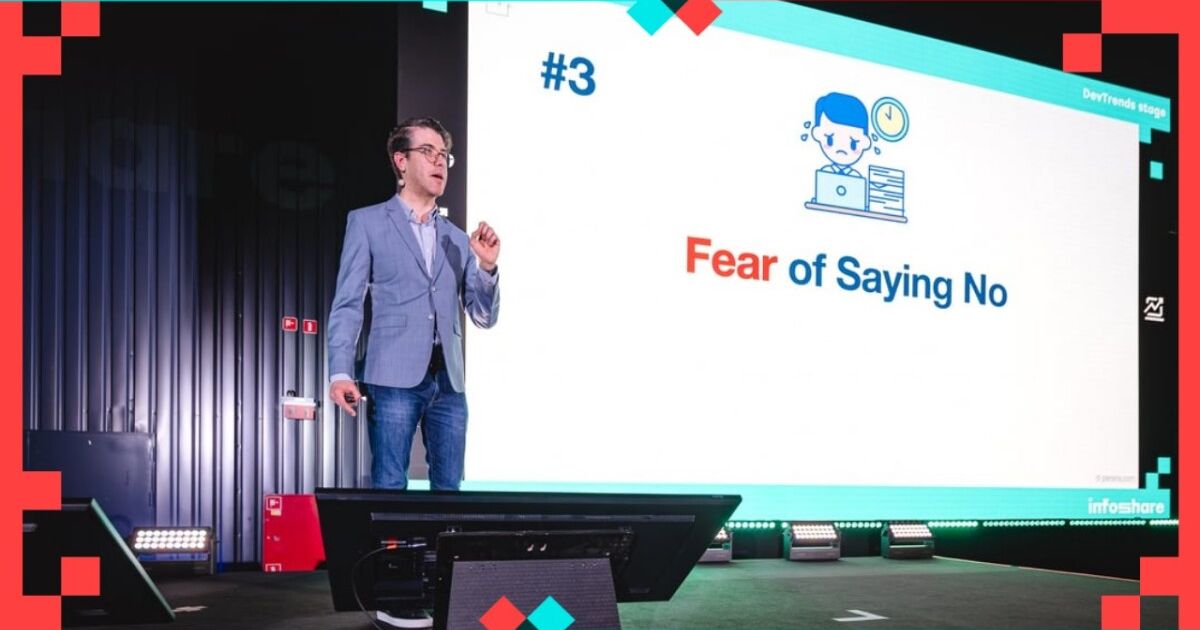VIEW SPEECH SUMMARY
1. Complexity and Value in Digital Product Creation
- Digital product creation is overly complex due to fear of the unknown.
- Many teams spend more time discussing work than doing meaningful work.
- The true measure is value creation, which often gets overlooked.
2. Two Realities in Product Teams
- Promised Land:
- Teams are empowered to make decisions aligned with a clear product vision.
- They have a strategy that guides prioritization and partnership with business.
- Regular customer engagement focuses efforts on value maximization.
- Harsh Reality:
- Teams lack empowerment and follow externally set decisions.
- Default visions serve to please executives rather than inspire the team.
- Strategy is vague or absent, roadmaps are prescriptive, leading to unnecessary features.
- Customer insights are often filtered through business without direct interaction.
3. Bullshit Management: The Antithesis of Product Management
- Often, product managers may fall into "bullshit management": busy work without value creation.
- Daily actions should be critically assessed for their contribution to true value.
- Bullshit management drains energy and reduces overall value created.
- It is inevitable but can be managed mindfully to minimize harm.
4. Common Traps and Techniques to Escape
- Massive backlogs as wish lists from all departments dilute focus.
- Lean backlog management: regularly prune old or irrelevant backlog items.
- Prioritize what truly matters, e.g., retention over miscellaneous features.
- Backlog items should “age like milk, not wine” — remain fresh and relevant.
5. Calendar-Driven Framework Trap
- Most work is actually dictated by meetings rather than frameworks like Scrum or Kanban.
- Unlimited meetings lead to reduced productivity and focus.
- Meetings should have clear goals, include only necessary participants, and be alternatives like emails when possible.
- Balance time spent in meetings; more than 30 hours a week harms productivity.
6. The Art of Saying No and Maintaining Relationships
- Saying no is key for focus but must be done without damaging stakeholder relationships.
- Instead of immediately saying yes or no, ask questions to clarify how a request aligns with current goals and strategies.
- There must be one clear goal; multiple priorities dilute effectiveness.
7. Recommendations and Actionable Items
- Run a "bullshit management check" to identify inefficient workflows such as excessive approvals, meeting marathons, or opinion-driven decisions.
- Prioritize tackling the biggest energy-drainers first.
- Simplify decision-making mechanisms with a clear product vision and strategy.
- Engage in product discovery to uncover what opportunities are worth pursuing.
- Adopt lean backlog management: discard items untouched for 3-6 months.
- Ensure meetings are purposeful and efficient; limit the total hours spent.
- Practice saying no constructively by asking how requests contribute to goals.
- Perform health checks on delivery, impact, feature removal, and failure management.
- Define and maintain a singular clear product goal.
- Continuously adapt strategy based on product maturity and learn quickly.
8. Closing and Resources
- The speaker shared his journey and the pitfalls he experienced in ineffective product management.
- He authored a book "Untrapping Product Teams" focused on hope and actionable improvement.
- Offers support to product teams seeking to break free from unproductive patterns.
---
Actionable Tasks Identified:
- Assess your backlog size; prune irrelevant or stale items ("lean backlog management").
- Evaluate meeting schedules; only hold meetings with clear goals and essential participants.
- Practice saying no by questioning requests' alignment with your current goal.
- Run a "bullshit management check" to eliminate unnecessary approval steps or opinion-based decision-making.
- Define one primary product goal to focus prioritization.
- Engage in regular product discovery to identify valuable opportunities.
- Conduct delivery health checks on your product development process focusing on speed of learning and impact.
- Remove unused or obsolete product features regularly.
- Foster direct customer engagement rather than relying solely on business as a proxy.
- Learn from failures by embracing small failures and avoiding large ones.
- Simplify processes where possible to maximize value creation and reduce wasted effort.
- Digital product creation is overly complex due to fear of the unknown.
- Many teams spend more time discussing work than doing meaningful work.
- The true measure is value creation, which often gets overlooked.
2. Two Realities in Product Teams
- Promised Land:
- Teams are empowered to make decisions aligned with a clear product vision.
- They have a strategy that guides prioritization and partnership with business.
- Regular customer engagement focuses efforts on value maximization.
- Harsh Reality:
- Teams lack empowerment and follow externally set decisions.
- Default visions serve to please executives rather than inspire the team.
- Strategy is vague or absent, roadmaps are prescriptive, leading to unnecessary features.
- Customer insights are often filtered through business without direct interaction.
3. Bullshit Management: The Antithesis of Product Management
- Often, product managers may fall into "bullshit management": busy work without value creation.
- Daily actions should be critically assessed for their contribution to true value.
- Bullshit management drains energy and reduces overall value created.
- It is inevitable but can be managed mindfully to minimize harm.
4. Common Traps and Techniques to Escape
- Massive backlogs as wish lists from all departments dilute focus.
- Lean backlog management: regularly prune old or irrelevant backlog items.
- Prioritize what truly matters, e.g., retention over miscellaneous features.
- Backlog items should “age like milk, not wine” — remain fresh and relevant.
5. Calendar-Driven Framework Trap
- Most work is actually dictated by meetings rather than frameworks like Scrum or Kanban.
- Unlimited meetings lead to reduced productivity and focus.
- Meetings should have clear goals, include only necessary participants, and be alternatives like emails when possible.
- Balance time spent in meetings; more than 30 hours a week harms productivity.
6. The Art of Saying No and Maintaining Relationships
- Saying no is key for focus but must be done without damaging stakeholder relationships.
- Instead of immediately saying yes or no, ask questions to clarify how a request aligns with current goals and strategies.
- There must be one clear goal; multiple priorities dilute effectiveness.
7. Recommendations and Actionable Items
- Run a "bullshit management check" to identify inefficient workflows such as excessive approvals, meeting marathons, or opinion-driven decisions.
- Prioritize tackling the biggest energy-drainers first.
- Simplify decision-making mechanisms with a clear product vision and strategy.
- Engage in product discovery to uncover what opportunities are worth pursuing.
- Adopt lean backlog management: discard items untouched for 3-6 months.
- Ensure meetings are purposeful and efficient; limit the total hours spent.
- Practice saying no constructively by asking how requests contribute to goals.
- Perform health checks on delivery, impact, feature removal, and failure management.
- Define and maintain a singular clear product goal.
- Continuously adapt strategy based on product maturity and learn quickly.
8. Closing and Resources
- The speaker shared his journey and the pitfalls he experienced in ineffective product management.
- He authored a book "Untrapping Product Teams" focused on hope and actionable improvement.
- Offers support to product teams seeking to break free from unproductive patterns.
---
Actionable Tasks Identified:
- Assess your backlog size; prune irrelevant or stale items ("lean backlog management").
- Evaluate meeting schedules; only hold meetings with clear goals and essential participants.
- Practice saying no by questioning requests' alignment with your current goal.
- Run a "bullshit management check" to eliminate unnecessary approval steps or opinion-based decision-making.
- Define one primary product goal to focus prioritization.
- Engage in regular product discovery to identify valuable opportunities.
- Conduct delivery health checks on your product development process focusing on speed of learning and impact.
- Remove unused or obsolete product features regularly.
- Foster direct customer engagement rather than relying solely on business as a proxy.
- Learn from failures by embracing small failures and avoiding large ones.
- Simplify processes where possible to maximize value creation and reduce wasted effort.
The Great Product Illusion: How to Move from Nonsense to Driving Value
13:00 - 13:30, 28th of May (Wednesday) 2025 / DEV TRENDS STAGE
What’s really holding your team back? It’s not a lack of talent or effort—it’s the broken system you’ve accepted as normal. David Pereira reveals the hidden time-wasters and myths that keep teams spinning their wheels, from pointless roadmaps to the cult of pleasing stakeholders for the sake of it.
This talk is a wake-up call for teams tired of doing “busy work” and ready to start delivering real impact. With candid insights and proven tactics, David empowers you to challenge the status quo and create the space to do work that truly matters.
Get ready to rethink how your team operates.
LEVEL:
Basic
Advanced
Expert
TRACK:
IT Leaders
Soft Skills
TOPICS:
Agile
ProductDev



